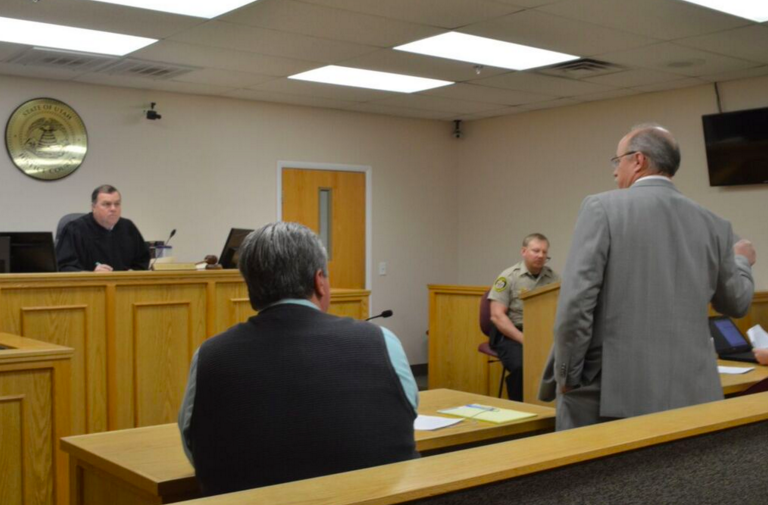Students, faculty and members of the community are searching for answers after tenured theater professor Varlo Davenport was recently fired after a complaint of assault was filed against him by a student in December.
Davenport was placed on administrative leave after the complaint was filed. A faculty review board conducted a hearing Jan. 29, where witnesses were called to testify and Davenport was allowed to defend himself. The faculty board exonerated Davenport and recommended he be reinstated after reviewing all the information presented. Dixie State University President Biff Williams decided to reject the faculty board’s consensus and permanently terminated Davenport on Feb. 25.
Bryan Benson, Davenport’s brother-in-law, made a public statement that explained the issues of the case. Benson said there must be significant cause and due process to fire a tenured professor.
Tenure is a faculty member’s permanent job contract, which can be granted after a six year probationary period. Davenport was a tenured professor who had been working at DSU for 15 years.
“Tenure exists for professors so that they are not just fired without cause,” Benson said. “It’s basically a guarantee of due process, which was lacking in this case.”
The incident
A female student filed the complaint of assault against Davenport for an incident that occurred in Davenport’s Acting I class on Nov. 21, 2014.
Witnesses testified on what they observed at the hearing.
Lizzy Peterson, a senior integrated studies major from St. George, was in the class when the incident occurred.
Peterson said the student who made the allegations was asked to perform her scene in front of the class with her partner even though she had not been in class for three weeks. The student was not a theater major and was shy and introverted, Peterson said.
Peterson said when the student was having trouble speaking up and displaying the anger that was necessary in her character, Davenport had two other students stand behind her and agitate the student to try to evoke anger from her.
When the student still wouldn’t display any emotion in her scene, “[Davenport] stood behind [the student] and started flipping her hair and nudging her in the same fashion as the previous two students had done,” Peterson said. “The class started laughing and another student made a comment on how resilient [the student] was.”
Davenport then held the student to the back of her chair by her shoulders and started flipping her hair and tilting her chair from side to side, Peterson said.
After a few more attempts at the scene, the student started wiping away tears from her eyes and Davenport made a speech to the class about how acting is about using your emotions and not hiding them, Peterson said. Davenport continued to use the rest of the class period on the student’s scene.
When she left at the end of the period, Peterson said “[the student] told us that she wasn’t mad, she just felt stupid because she felt embarrassed.”
Davenport said he only used physical resistance on the student to try to draw the best performance from her.
Davenport said using physical resistance to teach a student was “typical” of his teaching style and had been something he has used all 15 years of his teaching career at DSU.
“No one has ever complained before,” Davenport said. “All a student would have to do is say ‘stop’ and I would’ve stopped.”
Peterson said Davenport used the methods he did because he “honestly wanted [the student] to make improvements.”
Travis Cox, a professional actor in Los Angeles and former student of Davenport, said physical teaching methods like the ones Davenport used helped him become a better actor.
“Even professional directors use physical provocation to get at the real emotion,” Cox said. “The best acting teachers will play devil’s advocate to poke and pry at a student. It’s not easy, but it’ll make [the students] better prepared for the world of acting.”
Davenport said there were a couple of other things connected to the case on the outside, but because of the confidential nature of it, he would not explain further. However, the faculty review board saw everything in the hearing, Davenport said.
“For the most part, it was just another drama class,” Davenport said.
Administration response
President Biff Williams had until 5 p.m. Feb. 25 to make one of three choices after the hearing: accept the faculty board’s recommendation to reinstate Davenport, return the case to the board for further review, or reject the board’s decision and terminate Davenport, according to university policy.
Williams chose to fire Davenport.
Williams sent university police to Davenport’s home at 4:45 p.m. on Feb. 25, carrying a letter informing Davenport of his permanent termination, Davenport said. According to university policy, the president has the final decision.
“My frustration is that no one has talked with me about this — not the president, the department chair or the dean of students,” Davenport said. “I thought I’d at least have a chance to talk with them. I wasn’t given the chance to defend myself after the president made his decision.”
Davenport said he submitted his case to be reviewed by the faculty senate. He also reached out to the elected leaders of the faculty senate, Nate Staheli and Erin O’Brien, but never received a response from them, Davenport said.
Davenport said the main issue stems from problems in the official university policy.
“University policy on firing a tenured faculty member is vague,” Davenport said. “At DSU, there are plenty of rights for people making accusations, but there’s not as much for people facing accusation.”
Davenport said he never received anything from the president that stated why Williams rejected the consensus of the faculty review board.
“If the president made his decision because he knew something that I wasn’t able to defend myself on or present to the faculty board, then that is a violation of due process,” Davenport said.
Steve Johnson, DSU director of public relations, said because the issue is a confidential matter, DSU cannot comment on the incident or Davenport’s dismissal at this time.
President Williams’ official statement on the matter is: “Professor Davenport was given full due process afforded by DSU policy and procedure. His alleged misconduct and related information were fully vetted by a DSU faculty review board. Although the board recommended Professor Davenport’s reinstatement, I determined that the board’s position was contrary to the information presented.
“I understand that a criminal investigation is currently being conducted by local law enforcement. DSU declines further comment until the investigation is completed.”
Crystal Bates, a former student of Davenport, presented a petition to Williams to reinstate Davenport.
“When I gave [Williams] the petition, he said he was frustrated with everything the students are doing because they only know half of the story,” Bates said. “[Williams] said in two weeks, everyone will know the full story.”
Davenport said he received an anonymous tip on March 6 that informed him he was under investigation for having a sexual relationship with a student. However, those claims have since been proven false, Davenport said.
“As far as I’m aware, the investigation is still on the classroom incident,” Davenport said. “There was never anything sexual about the incident.”
In an email, Johnson said regardless of the university’s official stance, “I feel confident that in time the truth will come out, and I expect the same attention afforded to the truth that is currently being paid to the rhetoric currently out there.”
Student support
Students and members of the community have supported Davenport and have been taking action to ask for Davenport to be reinstated.
An online petition to reinstate Davenport has reached nearly 1,300 signatures. Katie Whitmire, one of Davenport’s former students, started the petition because she said she felt due process was not allowed for Davenport.
The petition was presented to Williams while he was in Salt Lake City by Bates. Bates said Williams was reluctant to meet with her and take the petition.
“We want answers,” Whitmire said. “Our main question that everyone is asking is ‘Why was a tenured professor let go after such a strong legacy?’”
Former students, supporters and theater teachers from across the state and country have pledged their support on the petition, Whitmire said.
During Davenport’s hearing on Jan. 29, students held a silent protest to support Davenport. Serena Dabney, a sophomore theater major from Las Vegas, attended the protest with several others, mostly theater students, she said.
“We sat outside of the administration building and did a melt — a meditative technique that our acting professors taught us,” Dabney said. “We wanted to show that we were being peaceful by showing support and not tearing anyone down.”
Corinne Nelson, a senior vocal major from Fallon, Nevada, is one of Davenport’s former students and is organizing a support event to benefit the Davenport family with help from other theater students. The “DSU Theater Showcase” will take place at the DiFiore Center on Main Street at 7 p.m. March 23.
“Students and alumni will be performing scenes, musical numbers and monologues,” Nelson said. “We want to show [Davenport] support by doing what we do best because of him: performing. The whole situation has left us all frustrated and angry, and I wanted us to forget that anger for a night and just show support.”
Whitmire said it’s clear how much people love Davenport as a professor because of the amount of support he has received.
“There has been fantastic support from the community and students,” Davenport said. “I’m blown away.”
Moving forward
While waiting for the investigation to be completed, the main question that students, supporters and community members are asking, is what will happen next?
Davenport said the chances the president will change his mind and he be reinstated are slim.
“But if I’m somehow retained, I want the university’s policy to be looked at and possibly revised,” Davenport said.
Davenport said his main concern right now is that with a complaint of assault on his record, he won’t be hirable elsewhere.
“I am far from perfect,” Davenport said. “But I would love the opportunity to clear my name. I’m an open book.”
Davenport said everyone has been very mature in supporting him through all the confusion he and his family have been experiencing recently.
“I love Dixie State,” Davenport said. “I don’t want to go. I just wish there was a way for a reconciliation to be reached.”
This news story was updated at 11 p.m. on March 10.



